人教版小学五年级英语上册句型
新人教版PEP五年级英语上册各单元知识点复习总结
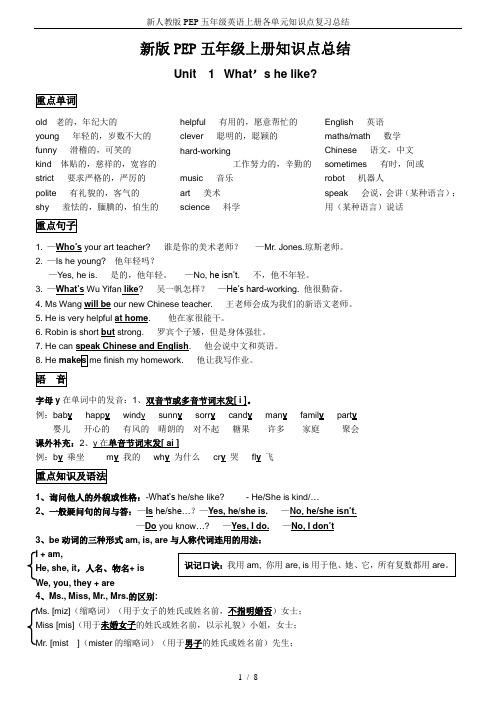
新人教版PEP五年级英语上册各单元知识点复习总结新版PEP五年级上册知识点总结Unit 1 What’s he like?重点单词old 老的,年纪大的young 年轻的,岁数不大的funny 滑稽的,可笑的kind 体贴的,慈祥的,宽容的strict 要求严格的,严厉的polite 有礼貌的,客气的shy 羞怯的,腼腆的,怕生的helpful 有用的,愿意帮忙的clever 聪明的,聪颖的hard-working工作努力的,辛勤的music 音乐art 美术science 科学English 英语maths/math 数学Chinese 语文,中文sometimes 有时,间或robot 机器人speak 会说,会讲(某种语言);用(某种语言)说话重点句子1. —Who’s your art teacher? 谁是你的美术老师?—Mr. Jones.琼斯老师。
2. —Is he young? 他年轻吗?—Yes, he is. 是的,他年轻。
—No, he isn’t.不,他不年轻。
3. —What’s Wu Yifan like? 吴一帆怎样?—He’s hard-working. 他很勤奋。
4. Ms Wang will be our new Chinese teacher. 王老师会成为我们的新语文老师。
5. He is very helpful at home. 他在家很能干。
6. Robin is short but strong. 罗宾个子矮,但是身体强壮。
7. He can speak Chinese and English. 他会说中文和英语。
8. He makes me finish my homework. 他让我写作业。
语音字母y在单词中的发音:1、双音节或多音节词末发[ i ]。
例:bab y happ y windy sunn y sorr y cand y man y famil y part y婴儿开心的有风的晴朗的对不起糖果许多家庭聚会课外补充:2、y在单音节词末发[ ai ]例:b y 乘坐m y 我的wh y 为什么cr y 哭fl y 飞重点知识及语法1、询问他人的外貌或性格:-What’s he/she like? - He/She is kind/…2、一般疑问句的问与答:—Is he/she…?—Yes, he/she is.—No, he/she isn’t.—Do you know…? —Yes, I do.—No, I don’t3、be动词的三种形式am, is, are与人称代词连用的用法:I + am,He, she, it,人名、物名+ isWe, you, they + are4、Ms., Miss, Mr., Mrs.的区别:Ms. [miz](缩略词)(用于女子的姓氏或姓名前,不指明婚否)女士;Miss [mis](用于未婚女子的姓氏或姓名前,以示礼貌)小姐,女士;Mr. [mist](mister的缩略词)(用于男子的姓氏或姓名前)先生;识记口诀:我用am, 你用are, is用于他、她、它,所有复数都用are。
人教版英语五年级上册Unit1_知识详解
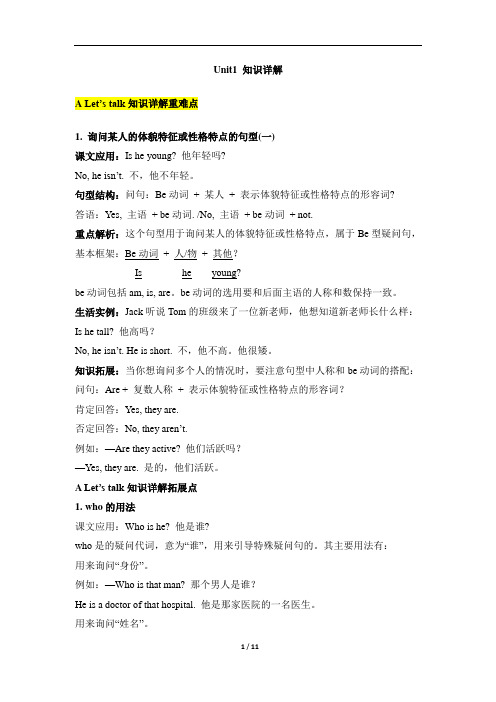
Unit1 知识详解A Let’s talk知识详解重难点1. 询问某人的体貌特征或性格特点的句型(一)课文应用:Is he young? 他年轻吗?No, he isn’t. 不,他不年轻。
句型结构:问句:Be动词+ 某人+ 表示体貌特征或性格特点的形容词?答语:Yes, 主语+ be动词. /No, 主语+ be动词+ not.重点解析:这个句型用于询问某人的体貌特征或性格特点,属于Be型疑问句,基本框架:Be动词+ 人/物+ 其他?Is he young?be动词包括am, is, are。
be动词的选用要和后面主语的人称和数保持一致。
生活实例:Jack听说Tom的班级来了一位新老师,他想知道新老师长什么样:Is he tall? 他高吗?No, he isn’t. He is short. 不,他不高。
他很矮。
知识拓展:当你想询问多个人的情况时,要注意句型中人称和be动词的搭配:问句:Are + 复数人称+ 表示体貌特征或性格特点的形容词?肯定回答:Yes, they are.否定回答:No, they aren’t.例如:—Are they active? 他们活跃吗?—Yes, they are. 是的,他们活跃。
A Let’s talk知识详解拓展点1. who的用法课文应用:Who is he? 他是谁?who是的疑问代词,意为“谁”,用来引导特殊疑问句的。
其主要用法有:用来询问“身份”。
例如:—Who is that man? 那个男人是谁?He is a doctor of that hospital. 他是那家医院的一名医生。
用来询问“姓名”。
例如:—Who is this? 这是谁?—This is Helen. 这是海伦。
用来询问“职务”。
例如:—Who’s he? 他是谁?—He is our monitor. 他是我们的班长。
用来询问其他方面的内容。
例如:—Who can help me? 谁能帮助我?—I can. 我能。
人教版(PEP三年级起点)小学五年级英语上册知识点
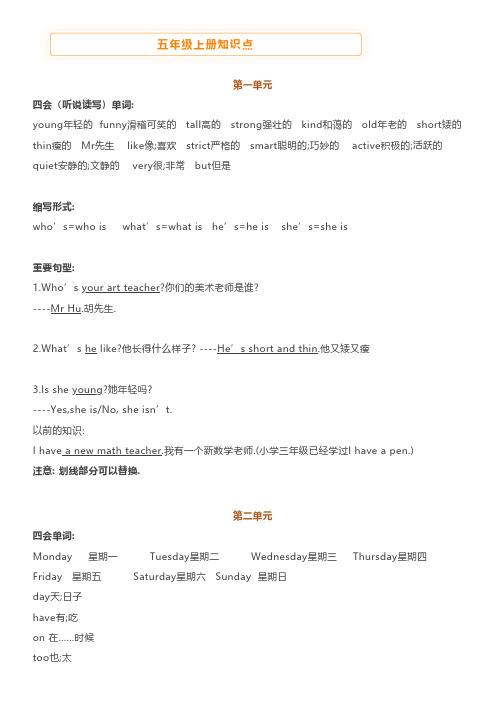
五年级上册知识点短语:do homework 做作业watch TV 看电视read books 读书What about? ......怎么样?do housework 做家务play computer games 玩电脑游戏重点句型:1.What day is it today?今天星期几?—It’s Monday.星期一.2. What do we have on Mondays?星期一我们有什么课?—We have English,science,computer and P.E.我们有英语课,科学,计算机跟体育课.3.What do you do on Saturdays?星期六你干什么?(具体的某一天前用介词on,在具体的时间前,用介词at)—I often do my homework.我通常做家庭作业.4.What about you?你呢?—I do my homework,too.我也是做家庭作业.第三单元四会单词:eggplant 茄子fish 鱼green beans 青豆tofu 豆腐potato 土豆tomato 西红柿for 为;给lunch 中餐;午饭we 我们tasty 好吃的;可口的sweet 甜的sour 酸的fresh 新鲜的salty 咸的favourite 最喜爱的;特别喜爱的fruit 水果grape 葡萄缩写形式:they’re=they are don’t=do not重点句型:1.What would you like for lunch?你午餐想吃什么?-----I’d like some tomatoes and mutton.我想吃一些西红柿跟羊肉.2.What’s your favourite fruit?你最喜欢的水果是什么?------/I like apples.我喜欢苹果.3.I don’t like grapes.我不喜欢葡萄.4.Bananas are my favourite.我最喜欢香蕉.第四单元一. 单词:empty the trash倒垃圾cook the meals 做饭water the flowers浇花sweep the floor扫地clean the bedroom打扫卧室make the bed铺床set the table摆餐具wash the clothes洗衣服do the dishes洗碗碟put away the clothes收拾衣服can’t = cannot(不会;不能)use a computer(使用计算机)二. 句子:1. I’m helpful! I can sweep the floor。
人教版小学英语五年级上册句型专项练习题
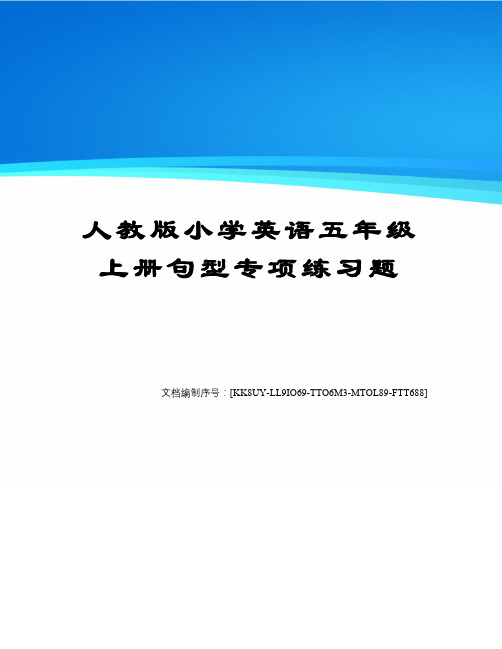
8、There arefivestudents in the classroom .
______________________________________________
9、I oftenwatch TVon the weekend .
___________________________________________
5、There is a blackboard on the wall .
___________________________________________
6、There are some trees in the park .
5、My favourite food isice cream.
______________________________________________
6、I candraw pictures.
______________________________________________
7、The ball isin front of the dog.
2、Onions are my favourite vegetable .
___________________________________________
3、I can do some kung fu .
___________________________________________
4、She is very helpful at home .
______________________________________________
人教版PEP英语五年级上册第一单元单词及重点句型-全
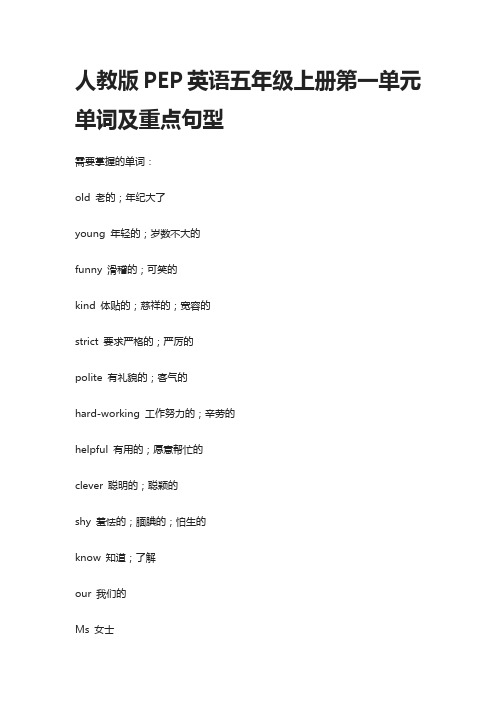
人教版PEP英语五年级上册第一单元单词及重点句型需要掌握的单词:old 老的;年纪大了young 年轻的;岁数不大的funny 滑稽的;可笑的kind 体贴的;慈祥的;宽容的strict 要求严格的;严厉的polite 有礼貌的;客气的hard-working 工作努力的;辛劳的helpful 有用的;愿意帮忙的clever 聪明的;聪颖的shy 羞怯的;腼腆的;怕生的know 知道;了解our 我们的Ms 女士will 将要sometimes 有时,间或robot 机器人him 他speak 会说;会讲(某种语言);用(某种语言)说话finish 完成;做好单元知识点一、核心词汇1.表示人体貌特征及性格特点的形容词: old老的;年纪大的young年轻的;岁数不大的funny 滑稽的;可笑的kind 体贴的;慈祥的;宽容的strict 要求严格的;严厉的polite有礼貌的;客气的hard-working 工作努力的;辛勤的helpful 有用的;愿意帮忙的clever 聪明的;聪颖的shy 羞怯的;腼腆的;怕生的2.短语: head teacher校长birthday party生日派对二、了解词汇1. 单词: know知道;了解our我们的Ms (用于女子的姓氏或姓名前,不指明婚否)女士will(谈及将来)将要sometimes 有时;间或robot机器人him(用作宾语或表语)他speak会说;会讲(某种语言);用(某种语言)说话finish 完成;做好2.短语: be strict with …对……要求严格be going to打算三、核心句型1. —Who’s your English teacher?谁是你们的英语老师?—Miss White.怀特老师。
解读:这是询问某个学科的老师是谁的句型及回答。
2. —What’s she like?她什么样?—She’s kind.她很和蔼。
人教版PEP英语五年级上册Unit 6 讲解

人教版PEP英语五年级上册Unit 6 讲解一、核心词汇1. 表示自然界事物的名词:forest森林;林区 river河;江 lake湖;湖泊mountain高山;山岳 hill山丘;小山tree树;树木;乔木2. 表示建筑类名词:bridge桥 building建筑物;房子;楼房village村庄;村镇house房屋;房子;住宅二、了解词汇1. 单词:boating划船 rabbit兔;野兔 high高的2.短语:go boating去划船 a ren’t=are not三、核心句型1. — Is there a river in the forest, Miss white? 怀特老师,森林里有河吗? — No, there isn’t.不,森林里没有河。
解读: 这是there be句型单数形式的一般疑问句, is there后加可数名词单数形式。
2. — Are there any lakes in the park?公园里有湖吗?— Yes, there are.是的,公园里有湖。
解读: 这是there be句型复数形式的一般疑问句,可以用来询问某处是否有某人或某物。
are there后面跟可数名词复数形式。
拓展: some和any都表示一些, some一般用在肯定句中, any用在疑问句和否定句中。
3. What a nice day!天气真好啊!解读:这是一个感叹句。
感叹句是表示人惊讶、恐惧、忧伤、愉快等感情的句子。
拓展: how引导的感叹句。
句型结构为“How+形容词/副词(+主语+谓语)!”4. Why not?为什么不呢?解读:这是日常生活中常用的口语,用来表示对对方提出建议的赞同。
四、了解句型1. Let’s go boating.我们去划船吧。
2. How many?有多少个?3. There is so much corn!里边有那么多玉米!解读: many和much都可以表示很多, many用来修饰可数名词的复数形式。
人教版五年级上册英语句型转换专项精选练习
人教版五年级上册英语句型转换专项精选练习班级:_____________ 姓名:_____________【句型转换】1. 按要求完成各题。
1.I washed the clothes last weekend.(就句子主题部分提问)2.There are many students doing homework.(改为一般疑问句)3.Twenty faces we can see.(就句子主题部分提问)4.Did you go to the Great Wall? (作否定回答)5.Did you have a good time? (作肯定回答)2. 按要求改写句子。
[1]I''m washing my clothes. (对句子主题意思提问)[2]I can make the bed. (对句子主题意思提问)[3]My sister is in the bedroom. (对句子主题意思提问)[4]My birthday is in June. (对句子主题意思提问)[5]She is writing a report. (改为一般疑问句)3. 句型转换。
1.Lingling goes to school at7o’clock.(主题意思提问) What ________ _______ Lingling go to school?2.Lily does morning exercises every morning.(改为否定句) Lily ________ _________ morning exereises every moming.3.We came back last week.(改为一般疑问句)_______ you ________ back last week?4.I can play basketball well(改为否定句).I ______ _______ basketball well.5.There are ten children in the park(对句子主题部分提问) _________ _________ children are there in the park?4. 按要求完成句子。
五年级人教版英语上册句型转换专项习题
五年级人教版英语上册句型转换专项习题班级:_____________ 姓名:_____________【句型转换】1. 按要求改写句子。
[1]She always has dancing lessons at weekends.(对句子主题意思提问)______ ______ she always______ at weekends?[2]Liu Tao usually chats with his friends on the Internet.(改为否定句)Liu Tao ______ usually ______with his friends on the Internet.[3]My cousin likes playing the guitar.(对句子主题意思提问)______ ______ your cousin like ______?[4]We usually fly a kite in the park.(改为一般疑问句)______ you usually ______ a kite in the park?[5]They often have dinner at home.(对句子主题意思提问)______ ______ they often have dinner?2. 按要求完成下列句子。
1.Do you miss your friends in China?(做否定回答)2.Can you catch the ball well?(做肯定回答)3.Where did you find your new cap?(用 in the bedroom 回答)4.They can''t help them. (改为一般过去时)They_________ _________them.5.The T-shirt is mine.(对句子主题意思提问)3. 按要求完成下列各题。
小学五年级人教版英语上册知识点总结
新版P E P 五年级上册知识点总结Unit 1old 老的,年纪大的young 年轻的,岁数不大的 funny 滑稽的,可笑的kind 体贴的,慈祥的,宽容的 strict 要求严格的,严厉的 polite 有礼貌的,客气的helpful 有用的,愿意帮忙的 clever 聪明的,聪颖的 hard-working工作努力的,辛勤的music 音乐 art 美术science 科学English 英语 maths/math 数学 Chinese 语文,中文 sometimes 有时,间或 robot 机器人speak 会说,会讲(某种语言);用(某种语言)说话1. —Who’s your art teacher? 谁是你的美术老师? —Mr. Jones.琼斯老师。
2. —Is he young? 他年轻吗?—Yes, he is.是的,他年轻。
—No, he isn’t. 不,他不年轻。
3. —What’sWu Yifan like ? 吴一帆怎样? —He’s hard -working. 他很勤奋。
4. Ms Wang will be our new Chinese teacher. 王老师会成为我们的新语文老师。
5. He is very helpful at home . 他在家很能干。
6. Robin is short but strong. 罗宾个子矮,但是身体强壮。
他会说中文和英语。
他让我写作业。
字母y 在单词中的发音:1、双音节或多音节词末发[ i ]。
例:bab y happ y windy sunn y sorr y cand y man y famil y part y 婴儿 开心的 有风的 晴朗的 对不起 糖果 许多 家庭 聚会 课外补充:2、y 在单音节词末发[ ai ]m y 我的 wh y 为什么 cr y 哭 fl y 飞 1、询问他人的外貌或性格:-What’s he/she like? - He/She is kind/…2、一般疑问句的问与答:—Is he/she…?—Yes, he/she is. —No, he/she isn’t. —Do you know …? —Yes, I do. —No, I don ’t3、be 动词的三种形式am, is, are 与人称代词连用的用法:I + am,He, she, it ,人名、物名+ is We, you, they + are4、Ms., Miss, Mr., Mrs.的区别: Ms. [miz](缩略词)(用于女子的姓氏或姓名前,不指明婚否)女士; Miss [mis](用于未婚女子的姓氏或姓名前,以示礼貌)小姐,女士; Mr. [mist ](mister 的缩略词)(用于男子的姓氏或姓名前)先生; Mrs. [misiz](用于已婚女子的姓氏或姓名前)太太;夫人。
小学五年级人教版英语上册知识点总结
新版PEP 五年级上册知识点总结Un it 1old 老的,年纪大的 you ng 年轻的,岁数不大的 funny 滑稽的,可笑的kind 体贴的,慈祥的,宽容的 strict要求严格的,严厉的 polite 有礼貌的,客气的helpful 有用的,愿意帮忙的 clever聪明的,聪颖的hard-work ing 工作努力的,辛勤的music 音乐 art 美术 scie nee 科学Who' syour art teacher一Mr. Jones 琼斯老师。
2. — Is he you ng 他年轻吗—Yes, he is. 是的,他年轻。
一No, he isn ' t.不,他不年轻。
3. — What ' Wu Yifan like吴一帆怎样 一He ' s harWorking.他很勤奋。
4. Ms Wang will be our new Chinese teacher.王老师会成为我们的新语文老师。
5. He is very helpful at home. 他在家很能干。
6. Robi n is short but stron g. 罗宾个子矮,但是身体强壮。
7. He can speak Chin ese and En glish. 他会说中文和英语。
8. He makes me fin ish my homework.他让我写作业。
字母y 在单词中的发音:1、双音节或多音节词末发 [i ]。
例:baby happy windy_ sunny sorry candy many family party婴儿 开心的 有风的晴朗的对不起 糖果 许多 家庭 聚会 课外补充:2、y 在单音节词末发[ai ] 例:by 乘坐 my 我的 why 为什么 cry 哭 fly 飞重点知识及语法丨1、 询问他人的外貌或性格: -What ' he/she like - He/She is kind/…2、 一般疑问句的问与答: 一Js he/she • — Yes, he/she is. — No, he/she isn' t.—Do you know … —Yes, I do. — No, I don '3、be 动词的三种形式 am, is, are 与人称代词连用的用法: 1 + am,------------------------------------------------------------------------------------------------------ He, she, it ,人名、物名+ is 识记口诀:我用am,你用are, is 用于他、她、它,所有复数都用are 。
- 1、下载文档前请自行甄别文档内容的完整性,平台不提供额外的编辑、内容补充、找答案等附加服务。
- 2、"仅部分预览"的文档,不可在线预览部分如存在完整性等问题,可反馈申请退款(可完整预览的文档不适用该条件!)。
- 3、如文档侵犯您的权益,请联系客服反馈,我们会尽快为您处理(人工客服工作时间:9:00-18:30)。
1 专项训练二:句 型 一、判断以下句子与图片描述的内容是(T)否(F)一致。
( ) 1. My uncle is old and shy. ( ) 2. I often play sports. ( ) 3. The onions are very hot. I don't like them. ( ) 4. I can play pingpong. ( ) 5. There is a clock on the desk. ( ) 6. There are some trees on the mountain. 二、为以下句子选择恰当的图片。 ( ) 1. I often watch TV on Sundays. ( ) 2. That boy is very polite. ( ) 3. I often clean my room on the weekend. ( ) 4. My favourite food is beef noodles. ( ) 5. How nice the plant is!
三、圈出正确的一项。 1. I (am is) helpful at home. 2. My sister (is are) kind and hardworking. 3. I would like some (banana bananas). 2
4. He often (read reads) books in the evening. 5. We sometimes (play play the) basketball in the park. 6. She will (play play the) piano for the party. 7. There (is are) some plants in the room. 8. Would you like some (tomato tomatoes) ? 9. (What How) a nice day! 10. I would (like eat like to eat) some noodles. 四、单项选择。 ( ) 1. Look________ my photo. A. in B. on C. at ( ) 2. I have an art class________ Thursday. A. on B. with C. for ( ) 3. Do you often________ cartoons here? A. draws B. draw C. drawing ( ) 4. Don't eat too________ sweet food. A. much B. many C. lot ( ) 5. ________ are my favourite food. A. Vegetable B. Tomato C. Sandwiches ( ) 6. Lily can do________ kung fu. A. any B. some C. a ( ) 7. There are________ in the room. A. much water B. many flowers C. many tree ( ) 8. That's my________ house. A. grandfather's B. grandpa C. grandparent ( ) 9. We want to go________ together. A. swim B. swimming C. to swimming ( ) 10. There aren't________ animals in the park. A. any B. some C. an
五、根据图片提供的场景,选择正确的句子完成对话,将其序号写在横线上。 3
六、根据图片提示,写出问题或答语。 1. —_____________________ __ —My brother is tall and funny.
2. —__________________________________ —We have science and maths.
3. —What do you often do on the weekend? —___________________________________
4. —What would you like to eat? —___________________________________
5.—______________________________ for the party? —She can play the pipa. 七、读对话,根据对话内容补全句子。 1. A: What's your new PE teacher like? 4
B: He is tall and strong, and he is strict. My new PE teacher is . 2. A: Do you often play football in the park? B: No, I often read books in the park. I often . 3. A: What do you have on Mondays, Danny? B: I have a cooking class. Danny has . 4. A: What's your favourite food? B: I like vegetables. They are healthy and delicious. I like________, because . 5. A: Are there any plants in your room? B: Yes, there are. They are near the desk. There are . 八、连词成句。 1. are so there pictures many here (. ) __________________________________________________________________ 2. there are any in the tall village buildings (?) ___________________________________________________________________ 3. have we next will a Tuesday party (. ) ___________________________________________________________________ 4. I on sometimes watch the TV weekend (. ) ___________________________________________________________________ 九、按要求做题。 1. My uncle is young and funny. (改为一般疑问句) ___________________________________________________________________
2. My favourite food is salad. (对画线部分提问) ___________________________________________________________________ 3. I often read books on Sundays. (改为一般疑问句) 5
___________________________________________________________________ 4. Are there any rivers in the nature park? (作否定回答) ___________________________________________________________________ 十、选择合适的句子,补全对话。 A: Hello. Nice to see you. B: Nice to see you, too. A: 1. ________ B: Yes, I do. I like playing football with my friends. 2. ________ A: No, I can't. I don't like sports. 3. ________ B: Yes, I do. I often play sports. And I have a football class on Sunday. A: 4. ________ B: Mr Liu. A: 5. ________ B: He is tall and strong. He is often strict. Sometimes he is funny. A: That's great. I like funny teachers. A. What's he like? B. Do you often play football in this park? C. Who is your PE teacher? D. Can you play football? E. Do you often play sports?
